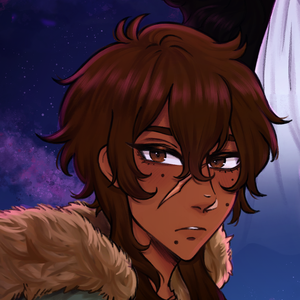5. Sa·mu·el
Alignment: north-east
There, amidst the intersection and seconds before the traffic lights turned back red, he stared endlessly at the parting clouds and found nothing other than an unwelcoming, empty void. He never knew the Sun, for it died long before he was born, but that did not mean Samuel had ever seen the stars — the true stars, not those manmade fabrications — either, yet it was in nights like this that he thought about what they probably looked like, shining so far away that he could never hope to reach them, and wondered if his sister ever had the chance to see them in her journeys.
Oh, how much he coveted it! To travel through the Federation and beyond, seeing sights he could not even begin to imagine! He asked himself if she had ever been to the continent, or to the rumored edge of the ocean, and he longed to accompany her on her trips — but he wasn’t good enough.
He was never good enough.
— and now she was dead or missing, somewhere far among the sea, leaving him alone in a city that never slept.
The digital clock on his wrist was old, half-broken and starting to fade, but he could still faintly make out the hour written in dim lit green numbers as he walked against the crowd, drowning ever further in the grey smog and the pervasive, ever present noises of that city without a name, for it was so unimportant that it was unworthy to be considered; inhabitants simply called it “Sete”, while in official documents it was considered the Development Project No. 7 — “where order and progress would soon follow” — but that— that organ, a system made of mouth, stomach and intestines made to devour and digest, was more than a mere appendix: it drunk deep of the abyss that they called “ocean” for lack of a better name, where all waters congregated and whalers made their fortune hunting men’s eternal foe in order to feed the frail foundations of this so-called “existence” — and its thirst would not be sated, not until it intoxicated itself with every little drop of saltwater, so the cities of the Federation could have a tomorrow — for such was the truth of that city, which slowly came to englobe all.
Taking another step, he drowned and choked in the magnitude of it all; yet no matter how far he went, that city held him in place with its skeletal fingers, rising from the ground like a giant and closing on him without mercy — made of glass, and concrete, and steel, and the smog of the Source as it rose from the gutters to poison his lungs.
But such was the life on the islands.
And despite everything, there still was the sea.
He could see the eastern ocean from there, to a degree — vast and endless, where only the brave and the depraved departed to in their whaling vessels in search of the Source to feed the beating heart of industry and corruption in Sete. To the east, there was nothing; no cities, no people, no anything, only the savage beyond and edge of the ocean — and yet, somehow, he came from there.
The dead should be left well alone.
Samuel clenched his fist and kept climbing those rusty outer stairs, fully aware he could fall at any moment to his doom. The elevator of the building didn’t work even before he moved there, and he couldn’t stomach the windowless, strangled darkness of the proper staircase — so he chose to be blown by the ocean breeze each and every day, only so he could catch a glimpse of the outside.
“Maria,” he called at the window, sitting on its edge and staring down at the building, an old and dilapidated thing that probably preceded the development project of Sete by at least a dozen years — made of red brick and decaying iron, it stood awkwardly amidst the shiny skyscrapers, like a relic of another time when things were simpler and clearer — not unlike the belltower by the shore.
He wondered what kind of place this was, once — before the Source, when all there was was the island and the sea, standing solitary at the edge of the world; for it must have been a not so unsightly place.
And yet, there was no response.











Comments (0)
See all